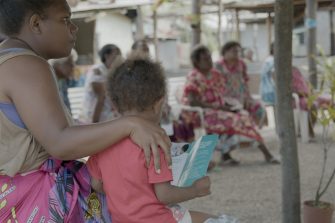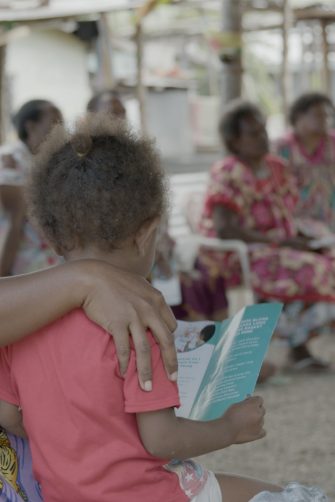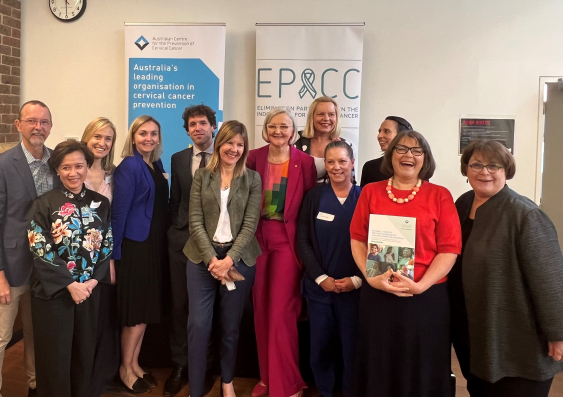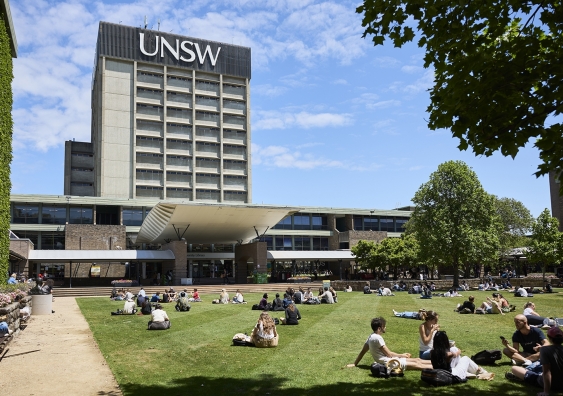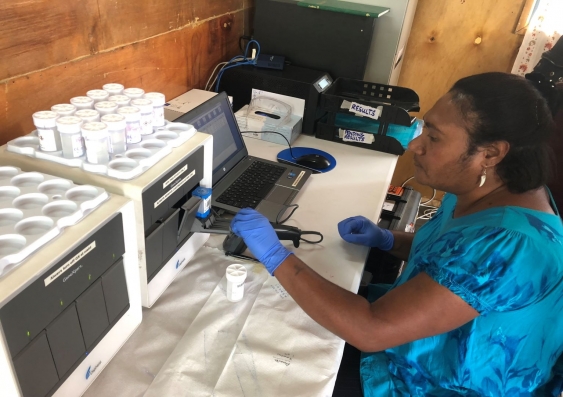UNSW Sydney has received a $25.9 million donation from the Swire Group. The funds will allow Kirby Institute at UNSW Sydney to screen thousands of women in seven Pacific countries for cervical cancer.
UNSW Sydney has received the largest single philanthropic donation in its history to work with regional partners to tackle one of the deadliest preventable cancers in the Pacific.
The $25.9 million donation from the Swire Group will enable the Kirby Institute at UNSW Sydney to work with partners in Australia and our region to support vital cervical screening and treatment services for over 130,000 women in seven countries: Fiji, Kiribati, Republic of Marshall Islands, Samoa, Solomon Islands, Tonga and Vanuatu.
Rates of cervical cancer in the Pacific are among the highest in the world, according to the World Health Organization, with Pacific women up to 14 times more likely to die from cervical cancer than women in Australia.
“Cervical cancer is the number one cause of cancer-related death among women in the Pacific and is devastating to women, families, and entire communities across our region. This generous investment will enable countries like Samoa to partner with the Kirby Institute to advance our vision of a world free of cervical cancer,” said Fiamē Naomi Mataʻafa, Prime Minister of Samoa.
Almost all cases of cervical cancer are caused by human papillomavirus (HPV) infection, a common virus spread through sexual contact. Most women with HPV infection or early cervical disease do not experience symptoms so early detection through screening is crucial.
“This landmark investment will enable us to work with countries across the Pacific over the next five years to advance our collective vision of a world free of cervical cancer and ultimately save thousands of lives across our region,” says Professor Andrew Vallely, who is co-leading the work at the Kirby Institute at UNSW Sydney with Project Manager Vanessa Price.
The Swire Group, which made the $25.9m donation, has its headquarters in the United Kingdom.
“We are delighted to support the Kirby Institute, which has an excellent reputation in the region for highly impactful research conducted in partnership with local leaders, communities, and organisations,” said Sam Swire, Executive Director. “Through Swire Shipping we have been serving the Pacific Island nations for over 70 years. Tragically, in the Pacific, women are dying from a disease that is preventable, and this programme targets its elimination,” he said.
The Vice-Chancellor and President of UNSW Sydney, Professor Attila Brungs, says the announcement is a triumph of effective collaboration to address an issue with major societal impact. “Through the generosity of the Swire Group, the commitment of Pacific country health departments, the tireless work of communities and services on the ground, and the expertise and support of UNSW’s Kirby Institute, we are moving towards a future where cervical cancer is no longer a threat to women.”
The Kirby Institute at UNSW Sydney has worked with partners in Papua New Guinea (PNG) and Australia since 2010 to co-design and evaluate strategies for cervical screening in PNG and other countries in the region. This new grant will build on the successes of the earlier Eliminating Cervical Cancer in the Western Pacific (ECCWP) program funded by the Australian Minderoo Foundation and complement the Elimination Partnership in the Indo-Pacific for Cervical Cancer (EPICC) program funded by the Australian government, and recently expanded as part of the Quad Cancer Moonshot Initiative in September 2024. Collectively, these initiatives will support countries on their journey to implementing sustainable cervical cancer elimination strategies.
Professor Anthony Kelleher, Director of the Kirby Institute, says he’s excited about working in partnership with Pacific Island communities to eliminate this preventable cancer.
"It is not acceptable that women in our neighbouring countries face considerably worse health outcomes than Australian women,” he said.
“At the Kirby Institute, we work with people for people to ensure that we all have equal access to high-quality, accessible, and appropriate health care."
Lindsay Robinson, Chief Advancement Officer at UNSW Sydney, said the donation demonstrates the University’s capacity for positive impact.
“We are profoundly grateful to the Swire Group for this exceptional donation, which exemplifies true partnership and empowers us to significantly enhance our efforts, ensuring a lasting impact on public health in the Pacific region."
In-country leadership will be supported by the Kirby Institute with key Australian and regional partners the University of Sydney, Australian Centre for Prevention of Cervical Cancer (ACPCC), Family Planning Australia, and the Pacific Community (SPC).
Overcoming barriers to access
Despite extensive efforts over many years, barriers have prevented Pacific countries from establishing and sustaining population-based cervical screening and vaccination programs. Challenges include the diverse geography of these nations, which are among the most remote and isolated in the world. This project will utilise advancements in cervical screening so that women who present to clinics can self-collect their own specimens, with results available in an hour.
“This approach is a game changer for the Pacific. Previous approaches involved invasive pelvic examinations and results could take weeks. Now with this donation from the Swire Group we can work with partner countries to sustainably build this highly effective screening strategy into health policy and services, enabling access to cervical screening and treatment and saving women's lives,” says UNSW Kirby Institute’s Vanessa Price.
Dr Falahola Fuka, Specialist in Obstetrics & Gynaecology for the Ministry of Health in Tonga, says this program will change lives for women and their families across the Pacific.
“We envision a cervical cancer-free Tonga, where every woman has access to life-saving HPV screening and treatment, creating a healthier future for women and fostering a society that prioritises prevention, education and access to health care. This funding will enable Tongan and Pacific women to live a life free from the burden of cervical cancer,” she said.
Dr Leanne Panisi, Head, Department of Obstetrics and Gynaecology, in the Solomon Islands says this funding presents an amazing opportunity for the Solomon Islands. “We see the burden at my end with patients, I see the suffering. I see patients with end-stage cervical cancer in my clinic every week,” she said.
Dr Paulus Ripa, who leads the ECCWP Program in the Western Highlands of Papua New Guinea, wants to see the end of suffering for women and their families.
“Close to 30,000 women have already benefited from the screening program here in Papua New Guinea, and now our neighbours across the Pacific will also have access to this life-saving service,” he said.
In the past decade, UNSW’s Kirby Institute has conducted research in partnership with the PNG Institute of Medical Research, national and provincial health authorities, medical societies and most importantly, women and their communities. It included the first field trials in the world to demonstrate the clinical effectiveness, safety, acceptability, scalability and cost-effectiveness of point-of-care HPV self-collection, testing and same-day treatment for cervical cancer prevention. This approach is now a key component of the WHO global elimination strategy.
Media enquiries
For enquiries about this story, please contact Julia Holman.
Tel: +61 435 124 673
Email: julia.holman@unsw.edu.au


